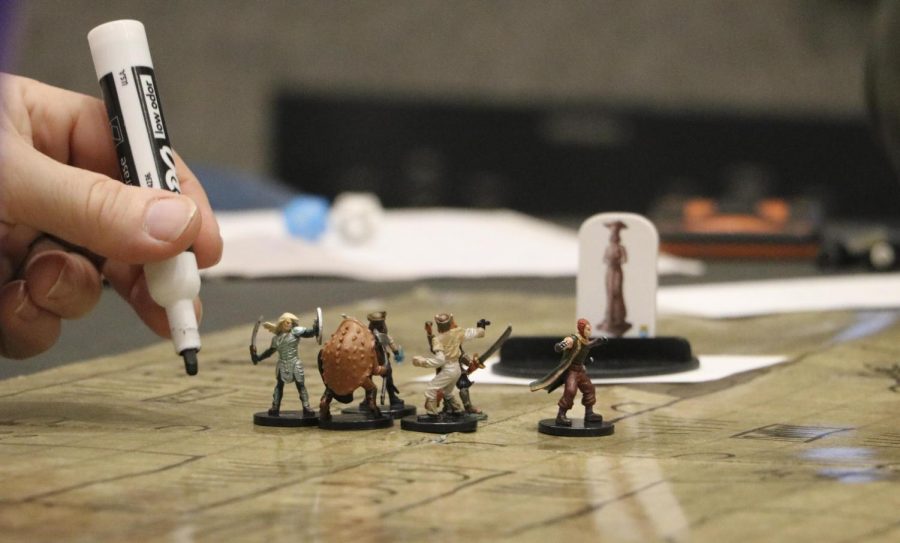The Golden Age of Board Games
October 12, 2018
A proud pair of fuzzy blue ears, a table cluttered with adventurers anxiously awaiting a bouncing die, strategic eyes cunningly deconstructing their opponent’s strategy and a fountain of boisterous laughter. A roleplay and gameplay paradise in the Conceptions Gamer Conclave ushered in its annual crowd to the College of DuPage last weekend. Although this community is highly supportive and tightly knit, it is usual for members of its individual niches to not cross game lines. Joseph Miller, long time game enthusiast, and Conceptions Gamer Conclave coordinator said that,
“Each game has their own little clique,” said Joseph Miller, a long time game enthusiast and coordinator of the event. “Take the Star Wars people. They all know each other, and they might play board games, but they won’t play Pathfinder. Pathfinder people won’t play Star Wars, but they may play board games. Magic the Gathering players will play Magic but not another collectible card game. They may play a board game.”
Therein lies the saving grace. It’s ane that manages to unify parties of different interest into a medium accessible for all: board games.
In an age where constantly progressing technology makes leaps and bounds every single moment, the death of board games seems all but an inevitability. Yet, according to Miller, board games are aspiring to new heights.
“I would say that we are in the golden age of board games,” he said. “No question. If you look at the plethora of games out there that are good, solid, replayable board games, it’s unbelievable. It used to be a dozen games like this a year, now you get a dozen a week.”
Board games in may seem somewhat antiquated in a world where video games are at the forefront of entertainment and attention. It’s the underlying intricacies of board games that keep them relevant, Miller said.
“There’s plenty of kids out there who are content to be in their parent’s basement in front of a computer screen,” he said. “That’s not what the real world’s about, and they’re going to figure that out. Board games are different. You sit down, and talk to somebody, and you find out things about them and become friends with each other. That’s part of life.
According to Miller, a local event like COD-Con coming up later this year in April can actually be a pretty big deal. It can ignite enough competitive fire to have players from around the country make the journey to come and compete in their favorite board games. Miller talked about the competitive culture behind boardgame series like 18xx in regards to COD.
“What they all have in common is that they all lay tiles to play, and stock can be bought and sold any number of times, and it affects the market,” he said. “It’s very competitive. If we do this for the spring show, we will get the national players. We’ll get people from Seattle, Dallas and Florida.”
Miller suspects this is only the beginning of a trend, as board game notoriety continues to grow in America. He mentioned the popularity of the biggest board game convention in the world. He believes board games are far from their peak. The biggest board game convention in the world is held in Germany every year, it’s called ESSEN. ESSEN draws over 100,000 people every year. That’s just for board games. Not role-playing games or video games.
Miller also believes that rather than hindering and corroding the board game world, technology has actually assisted in strengthening the social bonds between those who love to play them. In the past, board games may have been kept as a family past-time, whereas now they can be utilized as a tool for social intercourse at a community event or location. People can know about events by virtue of technology and social media updates. Miller thinks that therein lies the true value in board games.
“If someone is willing to spend some time going to their local tavern, library or convention and learn some new stuff it’s going to be better for them,” he said. “They’re going to get the social intercourse that the human psyche is driven towards. That makes up who you are. You don’t have to sit at home watching the same old TV show. There is more to life; you get to meet new people.”
Miller also has some ideas for how board games can stay relevant well into the future regardless of any technological advances
“Achieving the third dimension is something that a lot of games are already doing and are a good example of that,” he said. “It brings games into a new dimension of visualization. What determines whether or not a game will be popular is being quality made and having replayability. Also having enough wheels without being overly complex.”
Miller has been a role-playing and board game enthusiast his whole life. He spent 10 years working for the Game Manufacturers Association, one of the most substantial board game organizations in the country. While a director there, he helped organize some of the most significant annual game conventions in the country including the Gamut Trade Show in Las Vegas and Origins in Columbus, Ohio. He now independently organizes the Conceptions Gamers Conclave. He estimates it takes him about 150 hours to organize.
He maintains this steadfast commitment to what he does because he recognizes the power that comes from being able to call together such a diverse group of people.
“It’s indescribable, but one thing is for sure, you won’t find anybody unhappy in there. It doesn’t exist,” Miller said.


















